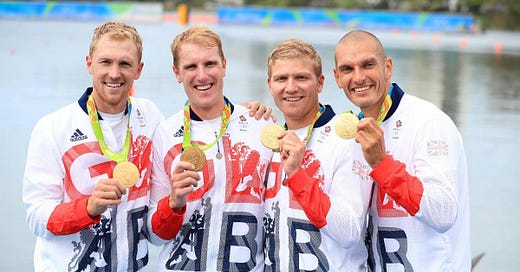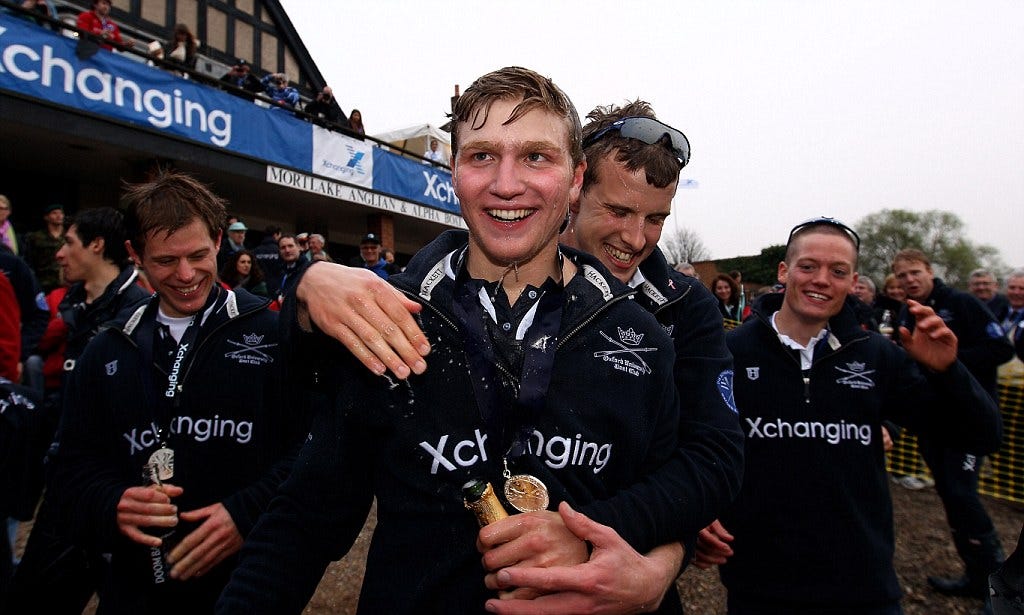Constantine started rowing aged 15. Whilst at school he competed at junior level before going to the University of Oxford where he raced in the university Boat Race four times. In 2012 he put his studies on hold to compete in the London Olympics in the men’s eight, coming away with a bronze medal. After graduating he competed in the Rio 2016 Olympics in the men’s four, winning a gold medal. During his sporting journey he was struck by the total lack of support for athletes’ mental health, in contrast to all the resources that were pointed at their training and physical health. He bore witness to a number of teammates who seriously struggled with mental health issues unsupported and is glad that the landscape is finally changing for them.
If you hadn’t been an athlete, what would you have gone into after school or university?
Probably a painfully conventional graduate career like finance or consultancy. I wasn’t one of those kids who grew up with a vocation, and I was lucky that sport allowed me to delay the career decision until I knew a bit more about the working world and about what I wanted. It also opened up a number of doors and gave me the confidence to do something slightly less conventional.
What experience or memory do you cherish most from your days of being a professional athlete?
Winning our Olympic final in Rio. We’d been building up to it for so long and the pressure was on as the British had won that event for four Olympics on the trot, from the days of Sir Steve Redgrave, and so winning was a huge relief. My family were all out there and sharing it with them was wonderful.
On the other hand I think training alongside some of my best friends at university is the experience I cherish the most. It’s technically not professional but the training hours weren’t a million miles away from that level. It sounds clichéd but making such good friends was genuinely the single best and most enriching part of my whole sporting experience.
What’s one thing you’re interested in or care about that most people don’t know?
The climate crisis. It’s the overarching challenge of our time. Like most people I sometimes feel forlorn about it but I would love to be able to contribute to a serious attempt to mitigate it. I think the angle I’m most interested in is political. One big concern is that nation-states aren’t able to fix it individually, but struggle to co-operate on it (as is obvious at COP); another is that democracy isn’t showing itself to be well-suited to tackling such a long-term challenge. I’m very interested in how we can overcome these challenges.
The prevalence of mental health problems in elite sport is incredibly high. Why do you think that is and how can we reduce it?
Mental health problems have been stigmatised in all domains because it’s been too easy to write them off as “not real” or to conflate them with weakness on the part of the sufferer. In elite sport it’s been even more extreme. Participating in elite sport requires toughness, and so the appearance of weakness given off by admitting to suffering from mental health problems has deterred athletes from talking about it or seeking help. That has combined with the high pressures of training and competition to drive up the prevalence of mental health struggles amongst elite athletes.
The first step to addressing the issue is talking about it. When athletes are suffering, they need to be able to admit it to themselves and to those around them, and to seek help. That requires cultural change, which is driven forward by normalising the public discussion of mental health issues. Happily there’s been a lot of positive cultural change since I left elite sport in 2016.
Careers are full of ups and downs. What caused you pain and how did you deal with it?
My lowest moment came in 2012 when a back injury came within a fortnight of preventing me from competing in London. I moved back in with my parents to get their support, and I leaned on my girlfriend (now wife!) for support. I also stayed in close contact with teammates who were assuring me that there was a space for me if/when I recovered.
Can you tell us about your experience of retiring and transitioning into the ‘real world’?
I fully respect that the transition is tough for a lot of athletes but in truth mine was quite smooth. I left having just fulfilled my highest sporting ambition, and I had always planned to retire after the Rio games. I went travelling for 6 months and felt a bit restless and directionless, but more because I wanted to know what was next than out of any desire to recreate what I had had. I didn’t enjoy the training by the end, and had always enjoyed uni training more than the rigours of the national team, so I felt very ready to leave. After I stopped, it was such a refreshing novelty to get 2 in every 7 days off and not to feel knackered and creaky the whole time!
I still exercise a fair bit, and that’s a legacy of years spent training up to 3 times a day and is important for my mental state. On top of that, I’ve derived a lot of satisfaction from working for a fast-growing startup with brilliant people for the last 5 years.
Any parting thoughts or words of wisdom for those youngsters that might be about to embark on a pro career, those in the middle of one, or those that might be coming towards the end?
Enjoy the journey. Even if you’re building up to a big final competition, most of the experience is in the preparation and that’s when most of the memories will be formed and friendships made. Spend time actually talking to your teammates and those around you - don’t be glued to devices the whole time. That’s a real risk for elite athletes who don’t have to work and so have a lot of spare time especially when they’re away for training or competition.
Think about life after sport. It doesn’t have to be super focused / directed at any particular field. But go out and meet interesting people, and follow up with them. A lot of very high-powered people are interested in athletes and will be interested in you and your story, and a lot of opportunities come from impromptu conversations. Read around areas that interest you. Use the career resources that are available to you. You don’t need to leave with a clear plan but making contacts and getting a sense of what options are available and what skills are valued in the working world will let you hit the ground running.
When you leave sport, the first thing you do doesn’t need to be the perfect or last thing. Try different things. Work hard at them. And change course if that feels right.
Finally, how can people follow what you’re up to and potentially reach out?
Email: constantinelouloudis@gmail.com
Twitter: https://twitter.com/clouloudis
LinkedIn: https://www.linkedin.com/in/clouloudis/






Would you like a voiceover of the whole interview as well as the text moving forward? Let us know by liking this comment or commenting below. Thx guys!
Yes! It’d be awesome instead of so much screen time. Getting close to a podcast (might be fab, like a mini Steven Bartlett for sports). Great interview! will send around to my British Rowing coaching friends and teams :)